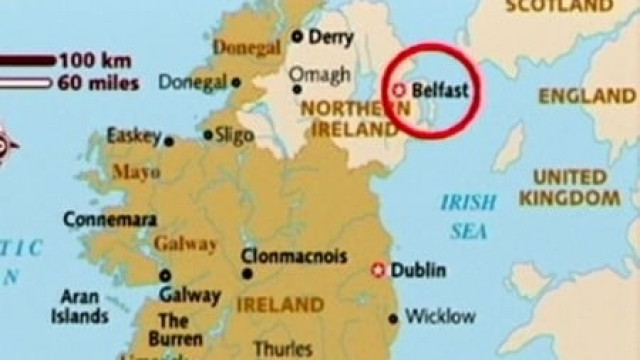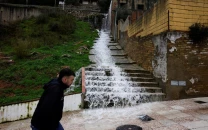Ireland blast injures three

The blast in Newtownhamilton, County Armagh, happened at around 11:25 pm (2225 GMT) Thursday, said a spokeswoman for the Police Service of Northern Ireland.
Three people were hurt and taken to hospital although their injuries were not believed to be life-threatening, police said. "Police were made aware that a vehicle had been abandoned in the area after a telephone call was received by a Belfast hospital at around 10:30 pm (2130 GMT)," said the spokeswoman. "Police were en route to the scene at the time of the explosion."
The alarm was first raised by firemen in the area who heard a series of gunshots before spotting a suspicious vehicle at about 10:40 pm (2140 GMT), according to local lawmaker Dominic Bradley, of the SDLP party.
"They immediately set about evacuating the area, involving shopkeepers and local people," he said.
There was no immediate claim of responsibility but dissident republicans seeking to destabilise the British province's peace process are usually blamed for such attacks. It was the second bombing in Northern Ireland after the handover of sensitive policing and justice powers earlier this month from London to Belfast, a vital step on the long-troubled province's path to peace. The first attack occurred on April 12 just minutes after the powers were transferred -- a bomb exploded near the Northern Ireland headquarters of Britain's MI5 security agency in a Belfast suburb.
Nobody was seriously injured in the attack, which was claimed by the dissident Republican IRA. Thursday's attack was also the second attempt to detonate a car bomb outside the Newtownhamilton police station this month.
A first bomb, consisting of containers of flammable liquid left in a car, was defused by the army after being left at the gates of the station on April 13, according to police. The latest attack Thursday came on the same day police warned rebel republicans in Northern Ireland were a greater threat than at any time since the Omagh bombing in August 1998, which killed 29 people.
As well as the MI5 attack, recent targetings of the Newry courthouse and the policing board headquarters in Belfast have sent shudders through the security services on both sides of the Irish border. "The situation has got worse since the threat was raised to 'severe'," said a senior police source. "This is probably as severe a situation as we have seen since that Real IRA bombing campaign of 1997 going into 1998. "It feels to us, just looking at it in every way, that this has picked up in terms of intensity and severity."
More than 3,500 people died in around three decades of civil strife in Northern Ireland between Catholics who wanted the province to become part of the Republic of Ireland and Protestants who wanted to stay within the United Kingdom.
The violence largely ended with the signing of the 1998 Good Friday peace accords, which paved the way for the current power-sharing administration between the Protestant DUP and the Catholic Sinn Fein parties. The main paramilitary groups including the IRA have laid down their arms, but sporadic violence has continued to plague the province, including the killing of two British soldiers and a policeman last year.



















COMMENTS
Comments are moderated and generally will be posted if they are on-topic and not abusive.
For more information, please see our Comments FAQ